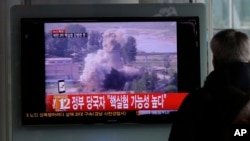PHNOM PENH - Cambodia joined many countries in the international community Tuesday in condemning an underground nuclear test in North Korea.
Cambodian typically enjoys warm relations with North Korea, but a Foreign Ministry spokesman on Tuesday called the test a provocative act, echoing sentiments expressed by world leaders, including US President Barack Obama.
“Cambodia is very disappointed with the North Korean nuclear test, which is a breach of a United Nations resolution,” Koy Kuong, a spokesman for the Cambodian Ministry of Foreign Affairs, said.
Tuesday’s powerful nuclear test followed previous, smaller detonations by North Korea in 2006 and 2009 and fueled worries that the isolated country is developing a weapon that could be mounted on a long-range missile.
Experts say they believe North Korea is still years away from that kind of technology. Still, the test was worrying to many leaders.
In a statement, Obama condemned the test as a threat to regional stability that increases the risk of nuclear proliferation.
Cambodian typically enjoys warm relations with North Korea, but a Foreign Ministry spokesman on Tuesday called the test a provocative act, echoing sentiments expressed by world leaders, including US President Barack Obama.
“Cambodia is very disappointed with the North Korean nuclear test, which is a breach of a United Nations resolution,” Koy Kuong, a spokesman for the Cambodian Ministry of Foreign Affairs, said.
Tuesday’s powerful nuclear test followed previous, smaller detonations by North Korea in 2006 and 2009 and fueled worries that the isolated country is developing a weapon that could be mounted on a long-range missile.
Experts say they believe North Korea is still years away from that kind of technology. Still, the test was worrying to many leaders.
In a statement, Obama condemned the test as a threat to regional stability that increases the risk of nuclear proliferation.




